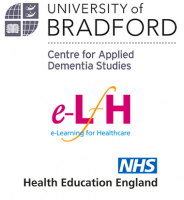Enabling People to Live Well with Dementia | Pharmacological Interventions in Dementia Care



This session will investigate the most common medications prescribed for people living with dementia, including their risks and benefits and the importance of regular recorded reviews.
Learning Objectives
By the end of this session you will be able to:
- List the most common medications prescribed for people living with dementia
- Describe the main risks and benefits of using a range of anti-psychotics, antidepressants, anxiolytics, anticonvulsants and cognitive enhancers
- Recognise issues with regards to polypharmacy for people living with dementia
- Explain the importance of recording and reporting side-effects and/or adverse reactions to medication
- Describe how to administer and review medication safely and appropriately in consultation with people affected by dementia
This session will investigate the most common medications prescribed for people living with dementia, including their risks and benefits and the importance of regular recorded reviews.
This session has been mapped to the Dementia Training Standards Framework and is designed to support the Dementia Action Alliance Dementia Statements.
Before commencing this session you may wish to complete:
- Module 1 – Introduction to Living with Dementia/Dementia Awareness (407-0030)
Hadar is a Senior Lecture in Pharmacy at the University of Bradford and has worked at various NHS Mental Health service providers in his career. Hadar is currently the lead Pharmacist for Medicine Safety for one of the largest third sector organisations providing mental health services in the North West of England.
Hadar has a varied research background and has undertaken several systematic reviews which have been used to inform clinical guideline development nationally and internationally. Hadar, through his experience and practice, provides specialist professional and clinical advice to the Care Quality Commission and regularly participates in inspections. Hadar has worked on expert advisory groups for the Medicines and Healthcare products Regulatory Agency and is a member of The National Institute for Health and Care Excellence serving in the Centre for Guideline Development.



- Anaesthesia | Transfer | Modes of Transport
- Posted By eIntegrity Healthcare e-Learning
- Posted Date: 2025-01-21
- Location:Online
- This session considers the transport options available to critical care teams for the secondary and tertiary transfer of critically-ill patients.
- Anaesthesia | Sepsis | Resuscitation and treatment...
- Posted By eIntegrity Healthcare e-Learning
- Posted Date: 2025-01-21
- Location:Online
- This session describes the initial resuscitation for the patient with sepsis and septic shock. It focuses on the resuscitation and initial cardiovascular management of sepsis.
- Anaesthesia | Sepsis | Assessment and differential...
- Posted By eIntegrity Healthcare e-Learning
- Posted Date: 2025-01-21
- Location:Online
- This session describes how to assess a patient with suspected sepsis and recognize the differential diagnoses in suspected sepsis both on admission to hospital and in hospital.
- Anaesthesia | Sepsis | Sepsis Pathophysiology
- Posted By eIntegrity Healthcare e-Learning
- Posted Date: 2025-01-21
- Location:Online
- This session provides an overview of the pathophysiological processes that underpin normal immune response to infection. It then outlines how these contribute to the development of sepsis.
- Anaesthesia | Recognition of the critically ill pa...
- Posted By eIntegrity Healthcare e-Learning
- Posted Date: 2025-01-21
- Location:Online
- This session defines the mortality rate for patients admitted to ICUs in the UK and discusses important aspects of severity of illness scoring systems that are applied to this population. This session also looks at the longer-term non-mortality outcomes e






